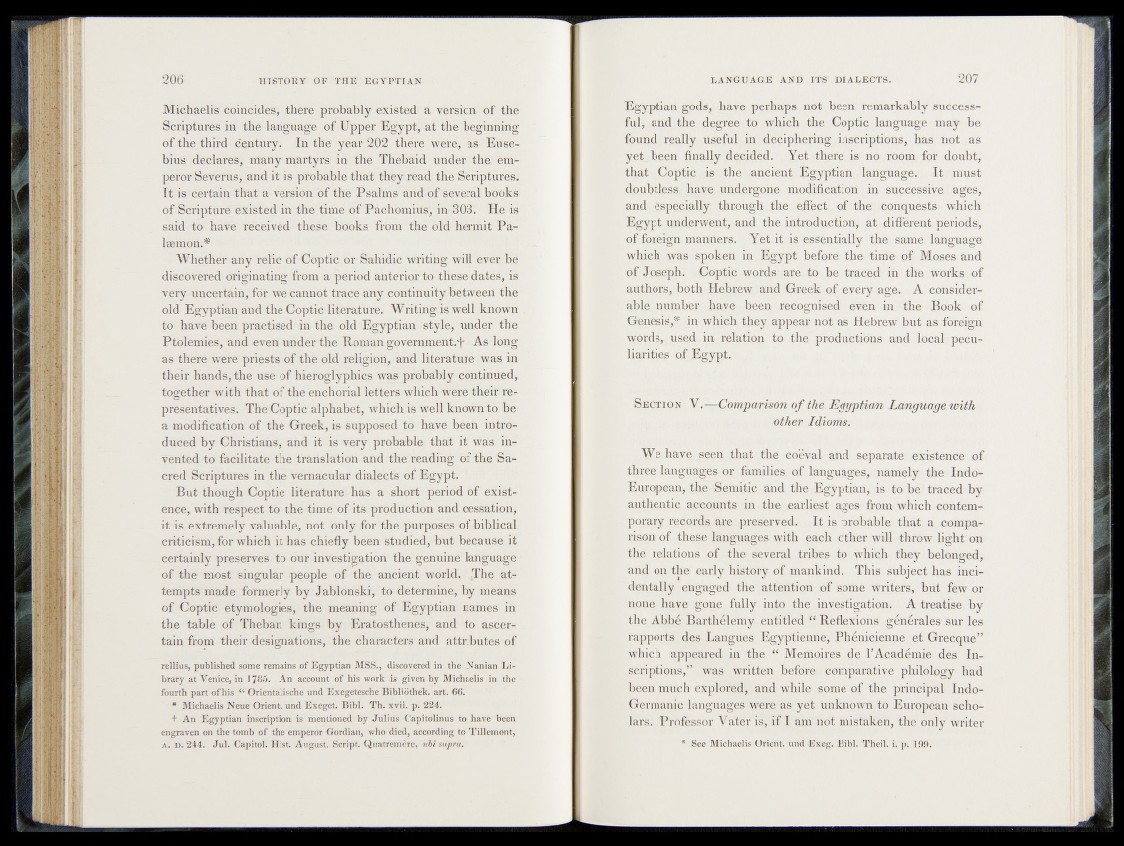
Michaclis coincides, there probably existed a version of the
Scriptures in the language of Upper Egypt, at the beginning
of the third century. In the year 202 theffe were, as Eusebius
declares, many martyrs in the Thebaid under the emperor
Severus, and it is probable that they read the Scriptures.
It is certain that a version of the Psalms and of several books
of Scripture existed in the time of Pachomiu^inFSOlf; He is
said to have received these books from the old hermit Pa-’
lsemon.*
Whether any relic of Coptic or Sahidic writing will ever be
discovered originating from a period anterior to these dates, is
very uncertain, for we cannot trace any continuity »between the
old Egyptian and the Coptic literature. Writing is well known
to have been practised in the old Egyptian style, under the
Ptolemies, and even under the Roman government.'!' As long
as there were priests of the old religion, and literature wasin
their hands, the use of hieroglyphics was probably continued,
together with that of the enchorial letters which were their rm
presentatives. The Coptic alphabet, which is well known to be
a modification of the Greek, is supposed to have béén introduced
by Christians, and it is very probable that it was im
vented to facilitate the translation and the reading of the Sacred
Scriptures in the vernacular dialects of Egypt.
But though Coptic literature has a short period of existence,
with respect to the time of its production and cessation,
it is extremely valuable, not only for the purposes ofbiblieal
criticism, for which it has chiefly been studied, but because it
certainly preserves to our investigation the genuine language
of the most singular people of the ancient world. »The attempts
made formerly by Jablonski, to determine, by means
of Coptic etymologies, the meaning of Egyptian names in
the table of Theban kings by Eratosthenes, and to ascertain
from their designations, the characters and attributes of
rellius, published some remains of Egyptian MSS., discovered in the Nanian Library
at Venice, in J785. An account of his work is given by Michaelis in the
fourth part'of bis “ Orieutalische und Exegetesche Bibliöthek. art. 66.
* Michaelis Neue Orient, und Exeget. Bibl. Th. xvii. p. 224.
+ An Egyptian inscription is mentioned by Julius Capitolinus to have been
engraven on the tomb of the emperor Gordian, who died, according to Tillemont,
a . d, 244. Jul. Capitol. Hist August. Script Quatremère, tiM supra.
Egyptian gods,' have perhaps not been remarkably successful,
and the degree to whieb the Coptic language may be
found really .useful in deciphering inscriptions, has not as
yet>).been finally'decided. , Yet;there' is no room for doubt,
that , Coptic is the ancient Egyptian language. It must
doubtless^ have undergone modification in successive ages,
and especially through the effect of the conquests which
Egypt .underwent, and the introduction, at different periods,
of foreign manners. Yet it is essentially the1 samé language
which was spoken in Egypt before the. time of Moses and
of Joseph. Coptic words are to.be traced in the works of
authors* both Hebrew and Greek of every âgée A considerr
able number, have been recognised even in the Book of
Genesis,* in which they appear not as Hebrew but as foreign
words, used in relation to the productions and local peculiarities
of Egypt.
. Section V .—Comparison of the Egyptian Language with
other Idioms.
We have seen that the coeval and separate existence of
three languages or families of languages, namely the Indo-
European, the Semitic and the Egyptian, is to be traced by
authentic accounts in the earliest ages from which contemporary
records are preserved. It is probable that a comparison
of these languages with each other will throw light on
the relations of the several tribes to which they belonged,
and on the early history of mankind. This subject has incidentally
engaged the attention of some writers, but few or
none have gone fully into the investigation. A treatise by
the Abbé Barthélemy entitled {t Reflexions générales sur les
rapports des Langues Egyptienne, Phénicienne et Grecque”
which appeared in the u Mémoires de F Académie des Inscriptions,”
was written before comparative philology had
been much explored, and while-», some of the principal Indo-
Germanic languages were as yet unknown to European scholars.
Professor Vater is, if I am not mistaken, the only writer
* See Michaelis Orient, und Exeg, Bibl. Theil. i. p. 199.